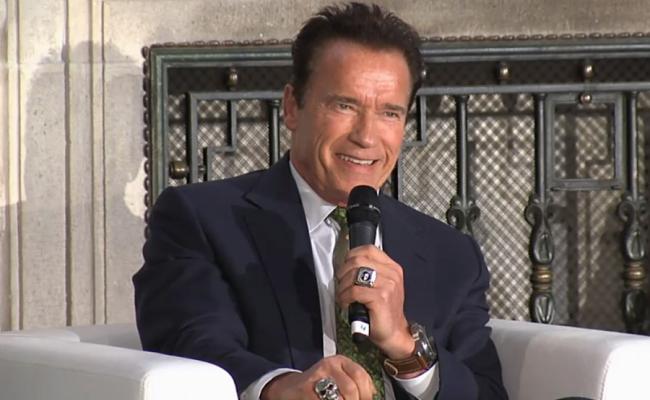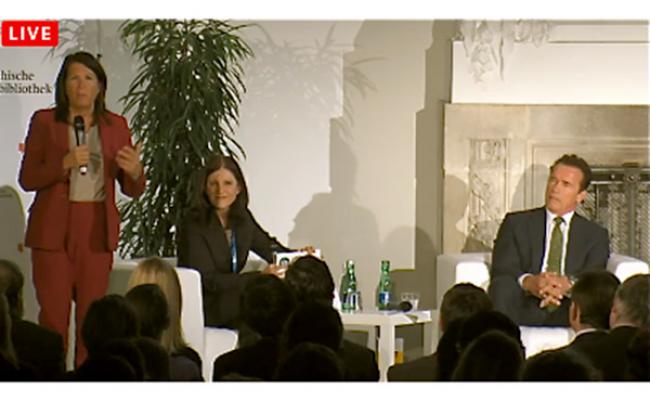On Thursday, January 31, 2013, R20 Founding Chair Governor Arnold Schwarzenegger, Austrian Chancellor Werner Faymann, along with the USC Schwarzenegger Institute hosted the Vienna R20 Global Conference on Renewable Energy and Climate – “Implementing the Sustainable Energy Future.”
The transformational interactive conference focused on practical and inspiring sub-national bottom-up actions from around the globe to build strong sustainable economies and make clean, local sources of energy available to everyone.
The Price School of Public Policy and the Schwarzenegger Institute offered USC students an opportunity to connect with over 1,000 of Vienna’s best and brightest university students for conversation with world leaders on leadership and addressing climate change via live webcast of the student event.
By Governor Arnold Schwarzenegger, R20 Founding Chair and Schwarzenegger Institute Chairman
I was truly proud to co-host the Vienna R20 Conference today with Chancellor Werner Faymann of Austria.
We had a great turnout of clean-energy leaders, including Romanian Prime Minister Victor Ponta and European Commission President José Manuel Barroso, and the discussions focused on how subnational governments can lead the charge to a sustainable future. I established the R20 after I saw how much we were able to accomplish in California even as the federal government in Washington was frozen on climate change, and our goal is to spread that kind of action around the world.
You can learn more about the R20 at www.regions20.org.
But I also wanted students to get involved. This conference is about how we can move forward at the grassroots, and the message was that we don’t have to wait for an international agreement to fight climate change. I don’t think you can get more grassroots than university students. I love meeting with students and reminding them of their tremendous power. Instead of being frustrated about international negotiations, there are things each of us can do as individuals. I think students are a great source of this type of people-power. So it was great to sit down with passionate students in Vienna and ask, “What will you do?”
I was also proud to be able to connect our students from USC via live webcast so that we could make this a truly global event. I can’t wait to speak to more students around the world as USC’s Professor Schwarzenegger.
I look forward to watching the ideas that grew out of this conference blossom and evolve, and I am truly excited to see the ways that the students we were able to involve can have their own impact on the world.
View from Vienna
By Terry Tamminen, R20 Strategic Advisor and Schwarzenegger Institute Board of Advisor
Scanning headlines anywhere in the world today, it’s not surprising to find people pessimistic about the future, especially as it applies to all things green. But the R20 conference in Vienna last week – – Implementing the Sustainable Energy Future – – may be reason for optimism on a global scale.
EU Commission President Jose Manuel Barroso kicked off the week with a rousing endorsement of the need for more sustainable energy systems and the commitment of the European Union to making it happen. Europeans have long been willing to pay something closer to the true cost of fossil fuels than other countries and regions of the world, but others at the conference made it clear that the technologies and policies are being put in place more broadly that should give us cautious hope for the future.
R20 Founding Chair, Governor Arnold Schwarzenegger, picked up on the national themes of President Barroso and showed how sub-national governments – – states, provinces, cities – – are making huge strides towards energy-efficiency, “zero-waste”, and renewable energy systems that will fundamentally shift the world to a “sustainable energy future”. He also showed how that future depends on getting everyone involved – – especially young people – – and inspired over 1,000 students at an event at the Austrian National Library (with thousands more watching online in collaboration with the USC Schwarzenegger Institute for State and Global Policy).
Indeed this may be the most optimistic sign for a more sustainable future that was evident all week in Vienna – – young people engaged, enthusiastic, and not willing to accept business-as-usual, in terms of public policy, technology or consumer choices. When all is said and done, fundamental change depends on remodeling more than laws or technology – – it depends in changing our thinking. Thanks to the universities and students I’ve seen from Los Angeles to Vienna lately, I’m very hopeful for the future.


